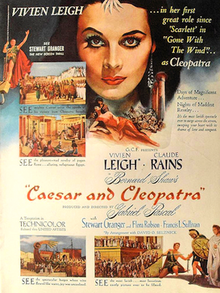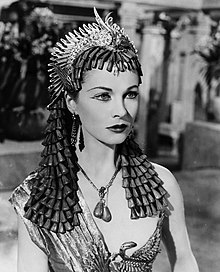
Vivien Leigh, styled as Lady Olivier after 1947, was a British actress. She won the Academy Award for Best Actress twice, for her performances as Scarlett O'Hara in Gone with the Wind (1939) and Blanche DuBois in the film version of A Streetcar Named Desire (1951), a role she had also played on stage in London's West End in 1949. She also won a Tony Award for her work in the Broadway musical version of Tovarich (1963). Although her career had periods of inactivity, in 1999 the American Film Institute ranked Leigh as the 16th-greatest female movie star of classic Hollywood cinema.
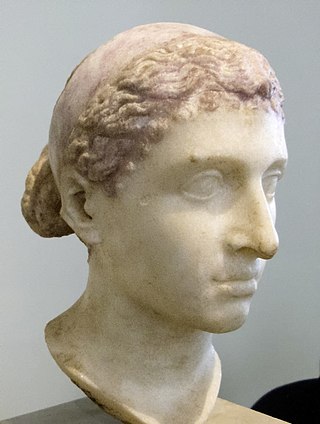
Cleopatra VII Thea Philopator was Queen of the Ptolemaic Kingdom of Egypt from 51 to 30 BC, and its last active ruler. A member of the Ptolemaic dynasty, she was a descendant of its founder Ptolemy I Soter, a Macedonian Greek general and companion of Alexander the Great. After the death of Cleopatra, Egypt became a province of the Roman Empire, marking the end of the last Hellenistic-period state in the Mediterranean and of the age that had lasted since the reign of Alexander. Her first language was Koine Greek, and she was the only known Ptolemaic ruler to learn the Egyptian language.

Jean Merilyn Simmons was a British actress and singer. One of J. Arthur Rank's "well-spoken young starlets", she appeared predominantly in films, beginning with those made in Britain during and after the Second World War, followed mainly by Hollywood films from 1950 onwards.

Stewart Granger was a British film actor, mainly associated with heroic and romantic leading roles. He was a popular leading man from the 1940s to the early 1960s, rising to fame through his appearances in the Gainsborough melodramas.

Samson and Delilah is a 1949 American romantic biblical drama film produced and directed by Cecil B. DeMille and released by Paramount Pictures. It depicts the biblical story of Samson, a strongman whose secret lies in his uncut hair, and his love for Delilah, the woman who seduces him, discovers his secret, and then betrays him to the Philistines. It stars Victor Mature and Hedy Lamarr in the title roles, George Sanders as the Saran, Angela Lansbury as Semadar, and Henry Wilcoxon as Prince Ahtur.
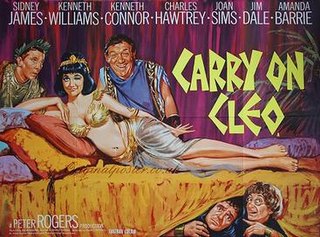
Carry On Cleo is a 1964 British historical comedy film, the tenth in the series of 31 Carry On films (1958–1992). Regulars Sid James, Kenneth Williams, Kenneth Connor, Charles Hawtrey, and Jim Dale are present and Connor made his last appearance until his return in Carry On Up the Jungle six years later. Joan Sims returned to the series for the first time since Carry On Regardless three years earlier. Sims would now appear in every Carry On up to Carry On Emmannuelle in 1978, making her the most prolific actress in the series. Jon Pertwee makes the first of his four appearances in the series. The title role is played by Amanda Barrie in her second and last Carry On. Along with Carry On Sergeant and Carry On Screaming!, its original posters were reproduced by the Royal Mail on stamps to celebrate the 50th anniversary of the Carry On series in June 2008. The film was followed by Carry On Cowboy 1965.
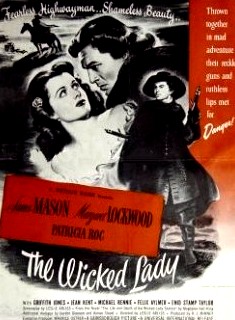
The Wicked Lady is a 1945 British costume drama film directed by Leslie Arliss and starring Margaret Lockwood in the title role as a nobleman's wife who becomes a highwaywoman for the excitement. The film had one of the largest audiences for a film of its period, 18.4 million.
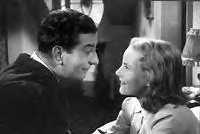
London Town is a 1946 Technicolor musical film directed by Wesley Ruggles and starring Sid Field and Petula Clark, generally regarded as one of the biggest flops in the history of British cinema.
Pothinus or Potheinos, a eunuch, was regent for Pharaoh Ptolemy XIII Theos Philopator of the Ptolemaic Kingdom. He is most remembered for turning Ptolemy against his sister and co-ruler Cleopatra, thus starting a civil war, and for having Pompey decapitated and presenting the severed head to Julius Caesar according to some sources.

Francis Loftus Sullivan was an English film and stage actor.
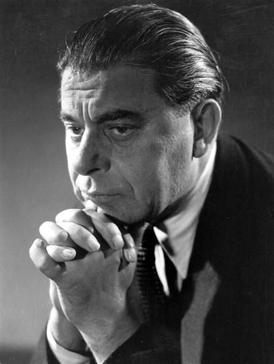
Gabriel Pascal was a Hungarian film producer and director whose best-known films were made in the United Kingdom.
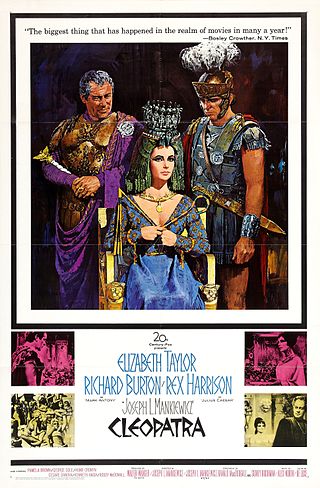
Cleopatra is a 1963 American epic historical drama film directed by Joseph L. Mankiewicz, with a screenplay adapted by Mankiewicz, Ranald MacDougall and Sidney Buchman from the 1957 book The Life and Times of Cleopatra by Carlo Maria Franzero, and from histories by Plutarch, Suetonius, and Appian. The film stars Elizabeth Taylor in the eponymous role. Richard Burton, Rex Harrison, Roddy McDowall, and Martin Landau also appear in major roles. It chronicles the struggles of Cleopatra, the young queen of Egypt, to resist the imperial ambitions of Rome.
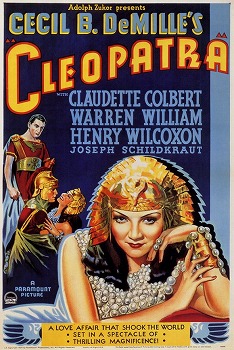
Cleopatra is a 1934 American epic film directed by Cecil B. DeMille and distributed by Paramount Pictures. A retelling of the story of Cleopatra VII of Egypt, the screenplay was written by Waldemar Young and Vincent Lawrence and was based on Bartlett Cormack's adaptation of historical material. Claudette Colbert stars as Cleopatra, Warren William as Julius Caesar, and Henry Wilcoxon as Mark Antony.

Caesar and Cleopatra is a play written in 1898 by George Bernard Shaw that depicts a fictionalized account of the relationship between Julius Caesar and Cleopatra. It was first published with Captain Brassbound's Conversion and The Devil's Disciple in Shaw's 1901 collection Three Plays for Puritans. It was first performed in a single staged reading at Newcastle upon Tyne on 15 March 1899, to secure the copyright. The play was produced in New York in 1906 and in London at the Savoy Theatre in 1907.
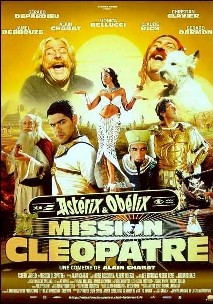
Asterix & Obelix: Mission Cleopatra is a 2002 French/German fantasy comedy film written and directed by Alain Chabat and adapted from the comic book series Asterix by René Goscinny and Albert Uderzo. Based on the book Asterix and Cleopatra, which had previously been adapted into a 1968 animated film. A sequel to Asterix and Obelix vs. Caesar (1999), it is the second installment in the Asterix film series.
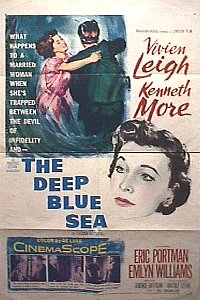
The Deep Blue Sea is a 1955 British drama film directed by Anatole Litvak, starring Vivien Leigh and Kenneth More, and produced by London Films and released by Twentieth Century Fox. The picture was based on the 1952 play of the same name by Terence Rattigan.

Saville Esmé Percy was an English actor who specialized in the plays of G.B. Shaw and appeared in 40 films between 1930 and 1956. He was born in London and died in Brighton.

Men of Two Worlds is a 1946 British Technicolor drama film directed by Thorold Dickinson and starring Phyllis Calvert, Eric Portman and Robert Adams. The screenplay concerns an African music student who returns home to battle a witch doctor for control over his tribe.

Worm's Eye View is a 1951 British Technicolor comedy film directed by Jack Raymond and starring Ronald Shiner and Diana Dors. Based on the 1945 play of the same name by R.F. Delderfield, it was produced by Henry Halsted and Byron Films.
Rufio was an officer of the Roman general and statesman Julius Caesar. In 47 BC he was appointed by Caesar as commander-in-chief of the three Roman legions that were stationed in Egypt.
